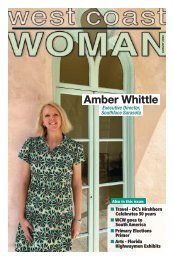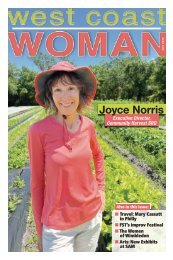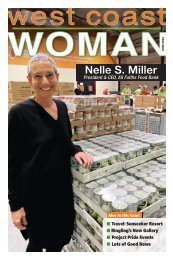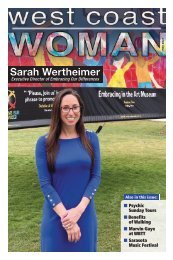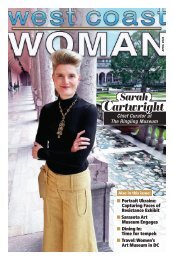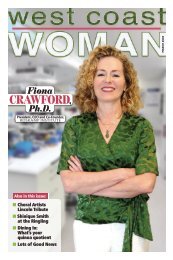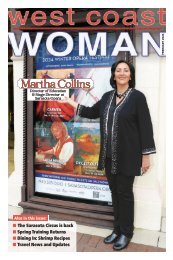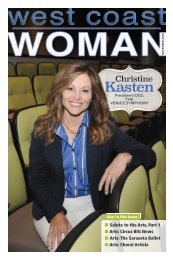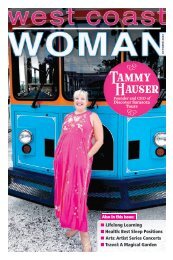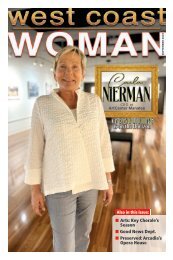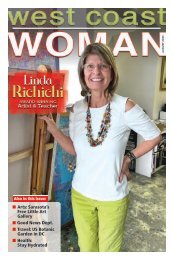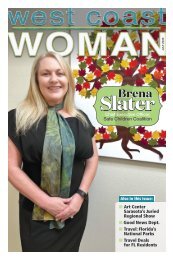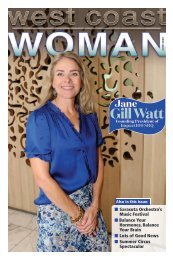WCWOct2022
October is a bigger issue with not only our Lifelong Learning issue, but also our Women’ Health issue. Learning centers have returned en masse with lots of new and always interesting and topical classes - learn something new, expand your mind and meet new friends. Plus a fun and spooky way to enjoy Halloween and a great Cocktail event. Plus we have our returning columns: Good News Dept., Arts News, Dining In (recipes), our calendars and lots more.
October is a bigger issue with not only our Lifelong Learning issue, but also our Women’ Health issue. Learning centers have returned en masse with lots of new and always interesting and topical classes - learn something new, expand your mind and meet new friends. Plus a fun and spooky way to enjoy Halloween and a great Cocktail event. Plus we have our returning columns: Good News Dept., Arts News, Dining In (recipes), our calendars and lots more.
Create successful ePaper yourself
Turn your PDF publications into a flip-book with our unique Google optimized e-Paper software.
Womenn’s Health<br />
Issue<br />
Facts about Breast Cancer and more<br />
How common is breast<br />
cancer? Breast cancer is<br />
the most common cancer<br />
in women in the United<br />
States, except for skin<br />
cancers. It is about 30% (or 1 in 3) of all new<br />
female cancers each year.<br />
The American Cancer Society’s estimates for<br />
breast cancer in the United States for 2022 are:<br />
• About 287,850 new cases of invasive breast<br />
cancer will be diagnosed in women.<br />
• About 51,400 new cases of ductal carcinoma<br />
in situ (DCIS) will be diagnosed.<br />
• About 43,250 women will die from breast<br />
cancer.<br />
Breast cancer mainly occurs in middle-aged<br />
and older women. The median age<br />
at the time of breast cancer diagnosis is 62.<br />
This means half of the women who developed<br />
breast cancer are 62 years of age or younger<br />
when they are diagnosed. A very small number<br />
of women diagnosed with breast cancer<br />
are younger than 45.<br />
Overall, the average risk of a woman in the<br />
United States developing breast cancer sometime<br />
in her life is about 13%. This means there<br />
is a 1 in 8 chance she will develop breast cancer.<br />
This also means there is a 7 in 8 chance<br />
she will never have the disease.<br />
Breast cancer is the second leading cause<br />
of cancer death in women. (Only lung cancer<br />
kills more women each year.) The chance that<br />
a woman will die from breast cancer is about<br />
1 in 39 (about 2.6%). Since 2007, breast cancer<br />
death rates have been steady in women younger<br />
than 50, but have continued to decrease in<br />
older women. From 2013 to 2018, the death<br />
rate went down by 1% per year. These decreases<br />
are believed to be the result of finding breast<br />
cancer earlier through screening and increased<br />
awareness, as well as better treatments. Inheriting<br />
BRCA-1 or other “cancer genes” does increase<br />
risk, but these inherited genetic factors<br />
are responsible for only about 5 to 10 percent<br />
of all breast cancers.<br />
Some variations in breast cancer can be<br />
seen between racial and ethnic groups. For<br />
example, The median age of diagnosis is slightly<br />
younger for Black women (60 years old)<br />
compared to white women 63 years old).<br />
Black women have the highest death rate<br />
from breast cancer. This is thought to be partially<br />
because about 1 in 5 Black women with<br />
breast cancer have triple-negative breast cancer<br />
- more than any other racial/ethnic group.<br />
Black women have a higher chance of developing<br />
breast cancer before the age of 40 than<br />
white women. At every age, Black women are<br />
more likely to die from breast cancer than any<br />
other race or ethnic group.<br />
White and Asian/Pacific Islander women<br />
are more likely to be diagnosed with localized<br />
breast cancer than Black, Hispanic, and American<br />
Indian/Alaska Native women. Asian/Pacific<br />
Islanders have the lowest death rate from<br />
breast cancer. American Indian/Alaska Natives<br />
have the lowest rates of developing breast<br />
cancer. Breast cancer occurs almost entirely in<br />
women, but men can get breast cancer, too.<br />
It’s important to understand that most<br />
breast lumps are benign and not cancer<br />
(malignant). Non-cancer breast tumors are<br />
abnormal growths, but they do not spread<br />
outside of the breast. They are not life threatening,<br />
but some types of benign breast lumps<br />
can increase a woman’s risk of getting breast<br />
cancer. Any breast lump or change needs to be<br />
checked by a health care professional to find<br />
out if it is benign or malignant (cancer) and if<br />
it might affect your future cancer risk.<br />
Source: The American Cancer Society<br />
Diet and Exercise:<br />
• A plant-based<br />
diet with a variety<br />
of fruits, vegetables,<br />
beans and whole<br />
grains can help you<br />
maintain a healthy<br />
weight and therefore<br />
lower your risk. Being<br />
active decreases<br />
risk for breast cancer.<br />
Vigorous activity<br />
decreases risk for<br />
pre-menopausal<br />
breast cancer. Carrying<br />
excess body<br />
fat increases risk for<br />
post-menopausal<br />
breast cancer.<br />
• Fat tissue causes inflammation, which can<br />
promote cancerous changes in healthy cells.<br />
Being overweight and obese increases blood<br />
levels of insulin and related hormones that<br />
can encourage the growth of cancer.<br />
• Drinking alcohol — in any form — raises<br />
breast cancer risk.<br />
• Alcohol influences blood levels of estrogen<br />
and other hormones in ways that may make<br />
cancer more likely.<br />
• Alcohol is a recognized carcinogen. It can<br />
cause cellular damage that can trigger<br />
cancer development<br />
Source: https://www.cancer.org/cancer/breastcancer/about/what-is-breast-cancer.html<br />
Making Strides Against<br />
Breast Cancer<br />
Since 1993, the American Cancer Society’s<br />
Making Strides Against Breast Cancer<br />
(MSABC) campaign has united communities,<br />
companies, and individuals with a collective<br />
goal to end breast cancer as we know it.<br />
Over the past two decades, the noncompetitive<br />
walks have collectively grown into<br />
the nation’s largest and most impactful breast<br />
cancer movement providing a supportive<br />
community for breast cancer survivors and<br />
metastatic breast cancer thrivers, including<br />
caregivers, and families alike.<br />
This year, Making Strides Against Breast<br />
Cancer celebrates its 30th anniversary and<br />
will take place in more than 150 communities<br />
nationwide. Making Strides of Sarasota<br />
Manatee is on Saturday, October 22 at Nathan<br />
Benderson Park, 5851 Nathan Benderson Circle,<br />
Sarasota.<br />
Parking for the walk will open at 7:30 am.<br />
All parking will be on the island at Nathan<br />
Benderson Park. Event festival area and registration<br />
will open at 7:30 am on walk day. Only<br />
those who are not yet registered need to<br />
check in on walk day. All participants need<br />
to be registered in order to participate in the<br />
walk and activities.<br />
The walk starts at 8:30 am. There will be<br />
both a 1 mile and 3 mile option to accommodate<br />
all abilities.<br />
Water Stops will be located in the event festival<br />
area as well as along the route.<br />
Strollers are welcome. Register and bring<br />
the entire family to celebrate. Food Trucks will<br />
be on site providing delicious options for you<br />
to purchase. Entertainment will be provided<br />
along the route from various local musicians.<br />
To learn more about the Making Strides of<br />
Sarasota Manatee or for other information,<br />
contact Bethany Lynch at bethanyk.lynch@<br />
cancer.org or call 941-867-7427.<br />
Breast Cancer Screening<br />
& Diagnostics Services<br />
at SMH<br />
Sarasota Memorial’s Brian D. Jellison Cancer<br />
Institute offers comprehensive breast cancer<br />
screening, diagnostic, treatment and support<br />
services. Their bbreast health services include:<br />
• 3D mammography (digital 2D mammography<br />
is available for patients who prefer it)<br />
• 3D mammography with SmartCurveTechnology<br />
• Genetic counseling and testing for hereditary<br />
cancers<br />
• Breast Ultrasound and MRI<br />
• Computer-aided Detection<br />
• Breast biopsy (stereotactic, ultrasound and<br />
MRI-guided biopsies)<br />
• Breast biopsy with Hologic Affirm System<br />
• Cyst aspiration<br />
• Ductography /<br />
galactography<br />
• Lymphoscintigraphy<br />
If you or someone you<br />
know is uninsured or cannot<br />
afford a mammogram,<br />
breast ultrasound, breast<br />
biopsy or other breast<br />
health service, call their<br />
Breast Health Grant<br />
Support Program for<br />
assistance: 941-917-7642.<br />
Sarasota Memorial offers<br />
mammography and<br />
advanced breast imaging<br />
services at eight locations<br />
in Sarasota County. To<br />
make an appointment,<br />
call 941-917-7322.<br />
Sarasota Memorial Breast Health Center<br />
Waldemere Medical Plaza, 1921 Waldemere<br />
St., Sarasota • 941-917-4101<br />
Sarasota Memorial Health Care Center<br />
at Heritage Harbour<br />
1040 River Heritage Blvd., Bradenton<br />
• 941-917-6440<br />
Sarasota Memorial Health Care Center<br />
at University Parkway<br />
5350 University Parkway, Sarasota<br />
• 941-917-4777<br />
Sarasota Memorial Health Care Center<br />
at Clark Road<br />
5880 Rand Blvd., Sarasota • 941-917-5111<br />
Sarasota Memorial Health Care Center<br />
at Blackburn Point<br />
929 S. Tamiami Trail Osprey, Sarasota<br />
• 941-917-4900<br />
Sarasota Memorial Hospital-Venice<br />
2600 Laurel Road E., North Venice<br />
• 941-261-9000<br />
Sarasota Memorial Health Care Center<br />
at Venice<br />
997 N. US 41 Bypass, Venice • 941-952-4250<br />
Sarasota Memorial Health Care Center &<br />
ER at North Port<br />
2345 Bobcat Village Center Rd., North Port<br />
• 941-257-2800<br />
The Sarasota Memorial breast cancer care<br />
team recommends that all women ages 40 and<br />
older have a screening mammogram and a clinical<br />
breast exam every year and that women<br />
ages 25 to 39 have a clinical breast exam every<br />
1 to 3 years. These recommendations may vary<br />
for women who have a history of breast cancer<br />
or an increased risk of developing breast<br />
cancer, so be sure to talk with your gynecologist<br />
and primary care physician to develop a<br />
screening schedule that’s best for you.<br />
The American College of Radiology designated<br />
Sarasota Memorial a Gold Standard<br />
Breast Imaging Center of Excellence. Sarasota<br />
Memorial’s Breast Health Center is a Certified<br />
Quality Breast Center of Excellence, as designated<br />
by the National Quality Measures for<br />
Breast Centers (NQMBC) program, placing it<br />
among an elite group of facilities recognized<br />
for continued commitment to providing quality<br />
breast care and reaching a level of national<br />
excellence.<br />
Sarasota Memorial is fully accredited by the<br />
American College of Surgeons’ Commission<br />
on Cancer and has maintained continuous<br />
Commission on Cancer (CoC) accreditation<br />
since 1988.<br />
24 WEST COAST WOMAN OCTOBER 2022



